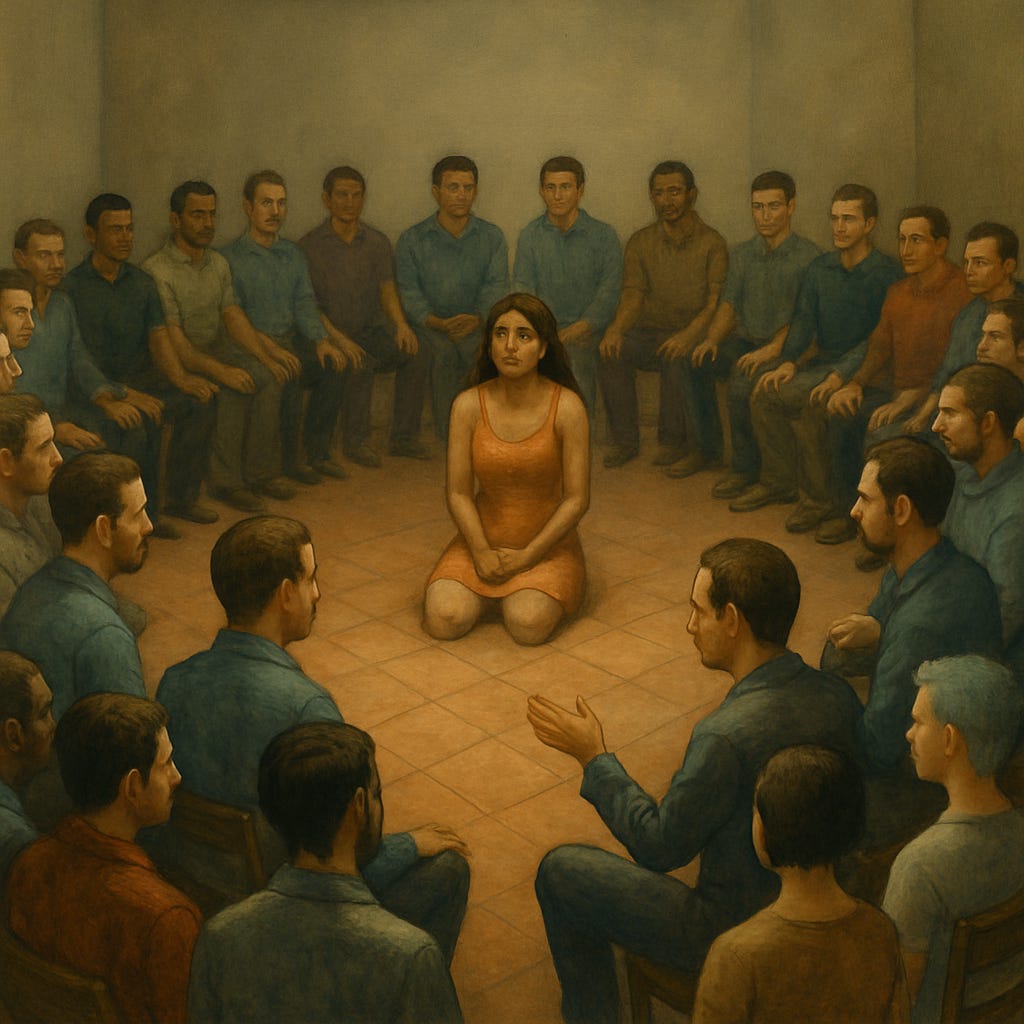“The future will be different if we make the present different.” — Paulo Freire
Now that I have introduced the key terms in my previous articles, Speaking Clearly, Holding Gently and When Care Meets Protection, I want to turn to the concept of mutuality and why I believe it carries profound potential for healing the gender divide that so deeply polarizes the modern world.
I recently attended a spiritual retreat that promised to explore new ways of seeing — what some call “going meta” or the ability to hold multiple perspectives while staying grounded in the realities of modern life.1 I had hoped for an illuminating experience for the soul, but what unfolded was something quite different. Perhaps no less useful, though certainly unexpected.
It began with a simple exercise that felt uncomfortably reminiscent of old-style encounter groups. The format seemed straightforward enough. We were asked to place one person in the center of the circle, while all others would offer feedback. The first to step forward was an attractive, young woman, one of only three in attendance; the rest of the group where comprised of men, about thirty in all.
Now to be fair, she volunteered to go first which is a story in it of itself and on the surface, this exercise may not seem like a problem. But let’s take closer look. Without an explicit relational container, the establishment of trust, or a shared intention, what emerged felt like another reenactment of a familiar modern pattern — women becoming objects of male attention, projection, and desire. In fact, more than five male participants confided in me afterward that they, too, felt very uncomfortable with the exercise for precisely this reason.
I am aware that my analysis here is far from complete, but I hope you can imagine the dynamic I am attempting to convey. When my turn came, I asked, “For what purpose are we doing this?” The facilitator, a respected voice in these circles, could not — or would not — answer. At that point, I chose to step back from this activity.
This is the problem we face too often in the Liminal Web. It is dominated mostly by men, earnest seekers who imagine themselves enlightened yet who consistently sidestep the tender work of acknowledging, let alone healing, what metamodern author, Hanzi Freinacht, refers to as the gender, sexuality, and family formation complex. Without that work, all the lofty talk about consciousness or transformation is in danger of collapsing into empty performance.
Why Gender Matters
Metamodernism, at its best, is about learning to hold paradox, integrate opposites, and create new forms of belonging. That requires us to take gender seriously, not only as a social construct but as something rooted in biology that shapes our psychology, perception, and relational patterns, especially in the very spaces where we gather to imagine a better future.
In my own work, I describe this phenomenon as embodied relationality or the practice of honoring difference while cultivating mutuality. Masculine and feminine patterns of attention — doing and being, narrow and broad focus, structure and flow — are not reducible to roles or stereotypes. They are deep evolutionary orientations that need one another in order to become whole.
For example, I remember a couple I worked with in my psychotherapy practice many years ago. He came into the room brimming with solutions, his mind constantly searching for ways to fix what was broken. She, in turn, longed simply to be heard, to have her feelings received without being managed. Their patterns clashed in ways that were both painfully familiar and profoundly human: the masculine impulse to act, the feminine need for presence.
When they finally slowed down enough to witness each other’s differences — to see them not as threats but as gifts — their whole dynamic shifted. He discovered that his action carried more depth when grounded in her presence. She found that her presence flourished when supported by his action. Over time, through consistent and courageous dialogue, they each began to take in what their partner embodied so naturally. He learned to cultivate a greater capacity to hold space for others, and for life itself, which led to wiser action. She, in turn, grew more confident in her own agency, which deepened her responsiveness. This is what I mean by embodied relationality. It is the movement from opposition into mutuality, where difference becomes a doorway rather than a wall.
This difference matters in our communal spaces too. Without contextual awareness, sexuality and gender politics can unconsciously dominate the field, leaving us caught in old patterns. What’s needed is not repression, nor unchecked performance, but clarity and trust. Unless these dynamics are made explicit and integrated, they are in danger of being acted out in ways that distort the purpose of gathering in the first place.
Toward a Meta-Feminism
This is why I believe we need a Meta-Feminism.2 Not a feminism of opposition alone, nor one reduced to sameness, but a feminism of mutuality, one that calls forth appreciation of our inherent differences across biological and psychological realms.
Meta-feminism recognizes that difference is not always a problem, but can be a source of new possibility. The feminine and the masculine, whether expressed through women and men, or through fluid and non-binary identities, offer complementary forms of intelligence. When we honor both, we begin to restore coherence at every level, that is, the personal, relational, and cultural.
Such a feminism does not bypass power dynamics, but it does not remain stuck in them either. It insists that healing the fractures of our time requires relational spaces rooted in emotional intelligence and the ability to repair ruptures. Without these, our experiments collapse into posturing. With them, we can begin to form the “small islands of coherence” that might one day heal the larger cultural field.
The Communal Heart
In my forthcoming book, I refer to this orientation as the Communal Heart — a relational field where difference is met with reverence, where feminine and masculine energies are reunited, and where something truly new can be born. It is not a return to traditional gender roles, nor a denial of them, but an integration that opens space for genuine creativity, intimacy, and shared responsibility.
This, to me, is central to the unfinished work of our times. We don’t just need more clever ideas or dramatic performances of enlightenment. We need courage to meet one another as we are, to honor the biological and psychological realities of difference, and to weave those differences into mutuality. That is the work of meta-feminism and I believe it is a compelling way to create cultures of belonging strong enough to meet the collective crises we are facing.
Recently in his article Wise Agency, Peter Limberger refered to these people as Meta-Moderns: “those who can go ‘meta’ and see truths from multiple perspectives, while still grounded in the rational and scientific foundations of modernity,” not to be confused with the Meta-Christians “who say we need to attune to the Tao/Logos, which was fully revealed and incarnated over 2,000 years ago through Christ.”
In this article, I introduce a third group which I call the Meta-Feminists: those who honor our biological, psychological, and cultural differences while affirming what unites us as human beings in a time of great transition.



I am curious about why the reluctance of the spiritual facilitator to provide a purpose for the excercise. what was the purpose of the gathering as a whole ? I personally prefer to know what are the purposes of the activities I am participating in. I like the idea of meta feminism. Maybe meta humanism also ? I remember the clarity of the purpose of the est program back in the 70s.
I feel excited about this series and your exploration -- and hope that (if not explicitly within the series, then maybe as a follow-up or outgrowth post) you can relate or integrate these concepts and "energies" (manifestations of orientations of attention) with patterns of receiving and penetration.
In the example you give (where the woman was longing to be received and her male partner seemingly initially incapable of that), I think it is important for people of both sexes (and all gender expressions) to learn that both "roles" (orientation) are necessary for genuine integration of perception and subsequent choice. As we are "penetrating" (with our imagination) the veil of the uncharted future, we must (by need of having to move into that future) choose actions. Even the choice of not acting is such a choice. And as such we cannot avoid "imagining" the consequences of our choices. And those imaginings need spacious receiving. So, in my intuitive understanding of agentic action, both aspects of attention (penetrating the hypothetical future with passion and erotic gusto, and then becoming still enough to presence-fully sense into the murmurations in our soul of the reflections of all our senses telling us whether the hypothetical we penetrated into is a "good one") are necessary for agentic living.
For me, the integration of the feminine and masculine principles is accomplished in a person who can, fearlessly, imagine the future, and then choose based on all their spacious presence faculty, sensing not only into the egoic aspects of consciousness (what is best *for me*), but sensing into the relational field (the Communal Heart), what is best *for everyone involved*. That takes an overcoming of fear and status-seeking, and an acceptance of the power flowing from our ability to penetrate.
Framing masculinity and penetrative energy as toxic is just as foolish as thinking of feminine presence as a "female quality" that only women need to demonstrate and master...